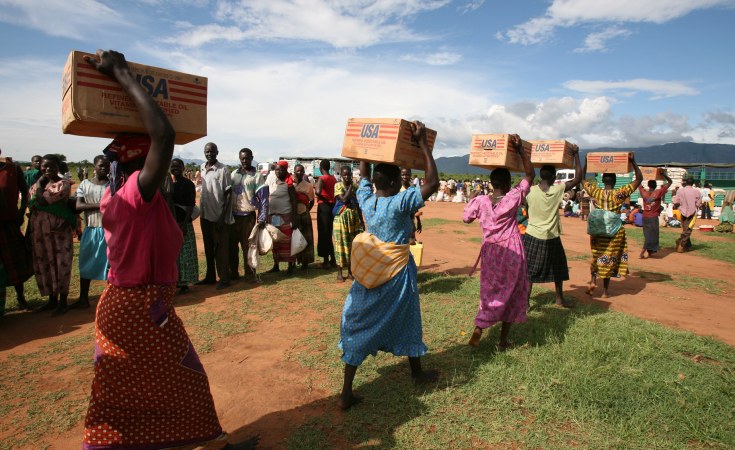Against the backdrop of an international economic downturn and changes in government leadership in the United States and United Kingdom, donors, development officials and economists are looking hard at how to improve the way foreign assistance is administered and used in Africa.
"The global recession… means that spending public money has got more serious, so the hard questions have to be asked and answered. There's a new seriousness of purpose," says Paul Collier, author of The Bottom Billion, a book that focuses on 50 of the world's failing states and the billion people who live in them.
He says the development and global security challenges posed by fragile states, such as Afghanistan and Somalia, have also contributed to the rethink. Additionally, discussion around foreign aid intensified with the release earlier this year of the book Dead Aid by Zambian economist **Dambisa Moyo.
Aiming for sustainability
In her book, Moyo calls for an end to most forms of foreign aid to Africa in five years, contending that the assistance has been largely ineffective and that the continent would do better by relying more on trade, investment and private international finance.
Njongonkulu Ndungane, president of African Monitor, a non-profit company that monitors aid to Africa, is a proponent of greater trade, but not at the expense of targeted foreign assistance.
"If you look at the Marshall Plan after World War II [under which the United States helped rebuild Europe], that was aid," he says. "Helping companies [to survive] the global economic meltdown – trillions of dollars being pumped to help people who have been irresponsible – that's some kind of aid. In this globalized environment we need one another, we need to help one another, whatever we call that."
However, Ndungane, a former Anglican archbishop of Cape Town, wants Africa to move away from aid dependency. "Aid is not sustainable. What is sustainable is trade and therefore we have the slogan 'aid for trade,'" he says. "We need to be channeling aid towards infrastructural development and towards encouraging intra-African trade... and creating an investment-friendly climate in Africa."
New Strategies
Some of the negative views of foreign aid stem from experiences of corrupt governments enriching themselves with donor money while letting their citizens continue to live in poverty. After five decades of foreign aid to Africa, skeptics point to inflated overhead costs, lack of sustainability of projects and a failure by donors to track critically where their money has gone.
Efforts are underway in the U.S. Senate to create legislation that would make short-term improvements to foreign aid, while laying the groundwork for long-term reform. One provision in the bill under consideration establishes an independent evaluation group to evaluate the results of all U.S. foreign aid programs.
"This new institution can address a fundamental knowledge gap in our foreign aid programs," said Democratic Senator John F. Kerry at a Senate hearing on reforming U.S. foreign aid policies. "Quite simply, it will help us understand which programs work, which do not, and why."
There are growing calls from economists and those who monitor aid for donors to insist on knowing how aid money is spent. In Somalia, the accounting firm PricewaterhouseCoopers will provide accountancy services to ensure that aid money does not disappear through graft. Recently, donors have required such oversight before releasing funds.
"The donors should be requiring that, as a matter of course everywhere in fragile states and not just belatedly in an extreme situation in Somalia," says Collier, a professor of economics at Oxford University and the director of its Centre for the Study of African Economics. "That's an example where you've got to face reality. The donors have been slow to do it but they are starting to do it."
Escaping the poverty trap
Jeffrey Sachs, author of The End of Poverty, agrees that the way foreign aid is administered needs to be improved but notes that despite problems in the past, tremendous gains have been made, saving millions of lives.
"Aid that is well targeted, scientifically based and utilizing powerful technologies to address specific challenges is by far the most successful kind of aid," says Sachs, director of the Earth Institute at Columbia University in New York.
"And the dominant successes in recent years have been in the health area where all of those criteria apply. If we're targeting malaria control through bed nets and the new generations of medicine, if we're targeting Aids treatment through anti-retroviral medicine, if we're targeting the control of vaccine-preventable diseases such as polio and measles or the worm infections, we see extremely powerful results at very low cost."
Sachs disagrees with Moyo that aid should end in five years. But he believes that within 15 years most countries can extract themselves from the poverty trap.
"I believe we ought to promote trade and investment and targeted development assistance in several critical areas: agriculture, health, education, basic infrastructure and business development," he says. "And I believe that if this is done, extreme poverty can be eliminated by 2025 and countries can be on the ladder of development on their own with self-sustaining economic growth."
** DEAD AID: Why Aid Is Not Working and How There Is a Better Way for Africa, by Dambiso Moya. The author was not available for an interview for this series of articles.


